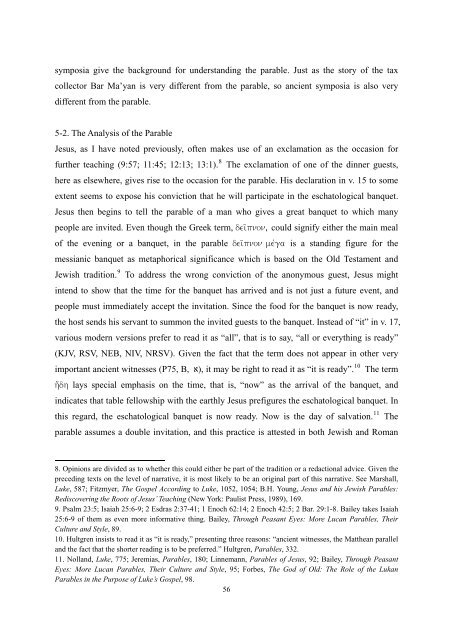the role of the lukan parables in terms of the purpose of luke's gospel
the role of the lukan parables in terms of the purpose of luke's gospel
the role of the lukan parables in terms of the purpose of luke's gospel
You also want an ePaper? Increase the reach of your titles
YUMPU automatically turns print PDFs into web optimized ePapers that Google loves.
symposia give <strong>the</strong> background for understand<strong>in</strong>g <strong>the</strong> parable. Just as <strong>the</strong> story <strong>of</strong> <strong>the</strong> tax<br />
collector Bar Ma’yan is very different from <strong>the</strong> parable, so ancient symposia is also very<br />
different from <strong>the</strong> parable.<br />
5-2. The Analysis <strong>of</strong> <strong>the</strong> Parable<br />
Jesus, as I have noted previously, <strong>of</strong>ten makes use <strong>of</strong> an exclamation as <strong>the</strong> occasion for<br />
8<br />
fur<strong>the</strong>r teach<strong>in</strong>g (9:57; 11:45; 12:13; 13:1).230F The exclamation <strong>of</strong> one <strong>of</strong> <strong>the</strong> d<strong>in</strong>ner guests,<br />
here as elsewhere, gives rise to <strong>the</strong> occasion for <strong>the</strong> parable. His declaration <strong>in</strong> v. 15 to some<br />
extent seems to expose his conviction that he will participate <strong>in</strong> <strong>the</strong> eschatological banquet.<br />
Jesus <strong>the</strong>n beg<strong>in</strong>s to tell <strong>the</strong> parable <strong>of</strong> a man who gives a great banquet to which many<br />
people are <strong>in</strong>vited. Even though <strong>the</strong> Greek term, could signify ei<strong>the</strong>r <strong>the</strong> ma<strong>in</strong> meal<br />
<strong>of</strong> <strong>the</strong> even<strong>in</strong>g or a banquet, <strong>in</strong> <strong>the</strong> parable is a stand<strong>in</strong>g figure for <strong>the</strong><br />
messianic banquet as metaphorical significance which is based on <strong>the</strong> Old Testament and<br />
9<br />
Jewish tradition.231F To address <strong>the</strong> wrong conviction <strong>of</strong> <strong>the</strong> anonymous guest, Jesus might<br />
<strong>in</strong>tend to show that <strong>the</strong> time for <strong>the</strong> banquet has arrived and is not just a future event, and<br />
people must immediately accept <strong>the</strong> <strong>in</strong>vitation. S<strong>in</strong>ce <strong>the</strong> food for <strong>the</strong> banquet is now ready,<br />
<strong>the</strong> host sends his servant to summon <strong>the</strong> <strong>in</strong>vited guests to <strong>the</strong> banquet. Instead <strong>of</strong> “it” <strong>in</strong> v. 17,<br />
various modern versions prefer to read it as “all”, that is to say, “all or everyth<strong>in</strong>g is ready”<br />
(KJV, RSV, NEB, NIV, NRSV). Given <strong>the</strong> fact that <strong>the</strong> term does not appear <strong>in</strong> o<strong>the</strong>r very<br />
10<br />
important ancient witnesses (P75, B, א), it may be right to read it as “it is ready”.232F The term<br />
lays special emphasis on <strong>the</strong> time, that is, “now” as <strong>the</strong> arrival <strong>of</strong> <strong>the</strong> banquet, and<br />
<strong>in</strong>dicates that table fellowship with <strong>the</strong> earthly Jesus prefigures <strong>the</strong> eschatological banquet. In<br />
11<br />
this regard, <strong>the</strong> eschatological banquet is now ready. Now is <strong>the</strong> day <strong>of</strong> salvation.233F The<br />
parable assumes a double <strong>in</strong>vitation, and this practice is attested <strong>in</strong> both Jewish and Roman<br />
8. Op<strong>in</strong>ions are divided as to whe<strong>the</strong>r this could ei<strong>the</strong>r be part <strong>of</strong> <strong>the</strong> tradition or a redactional advice. Given <strong>the</strong><br />
preced<strong>in</strong>g texts on <strong>the</strong> level <strong>of</strong> narrative, it is most likely to be an orig<strong>in</strong>al part <strong>of</strong> this narrative. See Marshall,<br />
Luke, 587; Fitzmyer, The Gospel Accord<strong>in</strong>g to Luke, 1052, 1054; B.H. Young, Jesus and his Jewish Parables:<br />
Rediscover<strong>in</strong>g <strong>the</strong> Roots <strong>of</strong> Jesus’ Teach<strong>in</strong>g (New York: Paulist Press, 1989), 169.<br />
9. Psalm 23:5; Isaiah 25:6-9; 2 Esdras 2:37-41; 1 Enoch 62:14; 2 Enoch 42:5; 2 Bar. 29:1-8. Bailey takes Isaiah<br />
25:6-9 <strong>of</strong> <strong>the</strong>m as even more <strong>in</strong>formative th<strong>in</strong>g. Bailey, Through Peasant Eyes: More Lucan Parables, Their<br />
Culture and Style, 89.<br />
10. Hultgren <strong>in</strong>sists to read it as “it is ready,” present<strong>in</strong>g three reasons: “ancient witnesses, <strong>the</strong> Mat<strong>the</strong>an parallel<br />
and <strong>the</strong> fact that <strong>the</strong> shorter read<strong>in</strong>g is to be preferred.” Hultgren, Parables, 332.<br />
11. Nolland, Luke, 775; Jeremias, Parables, 180; L<strong>in</strong>nemann, Parables <strong>of</strong> Jesus, 92; Bailey, Through Peasant<br />
Eyes: More Lucan Parables, Their Culture and Style, 95; Forbes, The God <strong>of</strong> Old: The Role <strong>of</strong> <strong>the</strong> Lukan<br />
Parables <strong>in</strong> <strong>the</strong> Purpose <strong>of</strong> Luke’s Gospel, 98.<br />
56
















